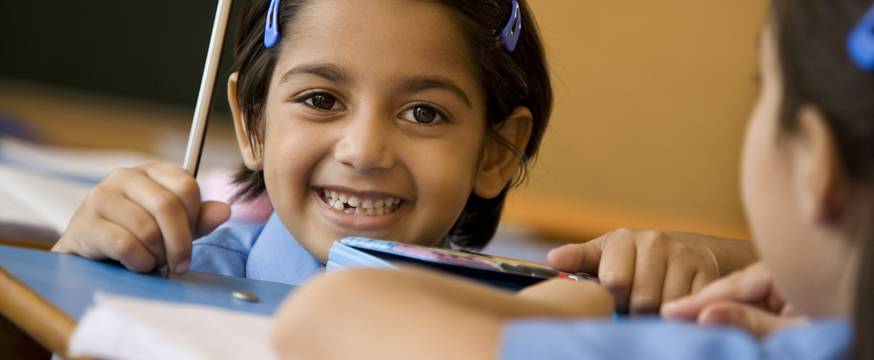
From access to quality: improving learning outcomes in South Asia
Research 31 Jan 2018 6 minute readACER India is working with partners across South Asia to ensure inclusive and quality education for all. Amit Kaushik reports on progress.
From access to quality: improving learning outcomes in South Asia
As countries in South Asia mobilise efforts towards improving the quality of education in a bid to achieve Sustainable Development Goal (SDG) 4 to, ‘ensure inclusive and quality education for all’, ACER India’s work in capacity development to support student learning assessments has never been more relevant in the region.
In most developing countries, the Millennium Development Goals of 2000 to 2015 have driven progress in improving enrolment and access to education. Building on this, SDG 4 targets improvement in the quality of education, and focuses sharply on measuring change, monitoring growth and utilising data – all of which depend critically on assessment. In support of that goal, countries in South Asia are therefore seeking technical expertise to build their capacities for strengthening student assessments to monitor learning outcomes.
The recent World Development Report 2018 released by the World Bank elaborates three dimensions of the learning crisis that the world is facing, one of which is poor learning outcomes. To improve learning outcomes, countries are initiating education system reform by engaging with education experts and others to measure learning and foster change. In addition, the international community has begun to emphasise the development of 21st-century skills like collaboration, communication, critical thinking and creativity needed to succeed in the rapidly changing world economy.
ACER India has provided capacity development and technical expertise to improve national student assessments in four South Asian countries. ACER India’s work with partners in Bangladesh, India, the Maldives, and Nepal is supporting capacity building in test development, data management, key statistical concepts and data analysis for large-scale assessments.
Bangladesh
ACER India’s work in 2017 with the Monitoring and Evaluation Wing (MEW) of the Directorate of Secondary and Higher Education in the Bangladesh Ministry of Education has supported the rollout of the Learning Assessment of Secondary Institutions (LASI) for students in Grades 6, 8 and 10 in English, Bangla and Mathematics.
Previously, ACER India collaborated with the MEW to support the implementation of the learning assessment of Secondary Education Quality and Access Enhancement Project (SEQAEP) institutions. The partnership was renewed in 2015, when Bangladesh decided to scale up the assessment to cover a representative sample of all secondary institutions in the country, and renamed it LASI.
The 2017 project primarily involved capacity development of the LASI committee members in areas of test development and key concepts of learning assessments through several workshops in Bangladesh and India. As a part of this project, ACER India reviewed the assessment frameworks and test administration manual, developed test items and assessment tools for the pilot and final assessment, advised on survey instruments and sampling plans, supported administration of the pilot, and analysed the pilot data.
India
ACER India in partnership with UNICEF India has provided technical assistance to Rajya Shiksha Kendra (RSK), Madhya Pradesh, in enhancing the capacity of state- and district- level education officials to implement large-scale student learning assessments. Several workshops have been held to train them with skill sets necessary to design, implement, analyse, and report student learning assessments.
ACER India also supported the development of an assessment framework, test items and assessment tools, sampling plans, monitoring formats, and test administration manuals to ensure the smooth rollout of the learning assessment. In addition, ACER India has undertaken psychometric analysis to examine data obtained from the existing learning assessment, Pratibha Parv, and has provided recommendations for improvements.
Under a new partnership with UNICEF India, ACER India is also involved in the capacity development of 170 education officials representing 17 UNICEF targeted states on robust learning assessments.
Maldives
ACER India’s engagement with the Maldives National University has been in two distinct phases. In the first phase, ACER India developed course content for two Masters units on assessment, ‘Introduction to Educational Testing’ and ‘Construction of Educational Tests’, offered by the Maldives National University. During this process, ACER India also conducted capacity development workshops for selected university staff addressing course content, and ACER’s approach to pedagogy and assessment.
In the second phase, ACER India staff taught the first unit of the course and supported university staff members in teaching the second unit.
Nepal
In Nepal, ACER India’s ongoing work includes a series of capacity development workshops under the World Bank-funded capacity development program for the nation’s Education Review Office (ERO). The ERO is responsible for the National Assessment of Student Achievement, a low-stakes assessment carried out across private and public schools every two years. ACER India’s training will strengthen the capacity of ERO staff in data management, scale development, data analysis and reporting, key statistical concepts, and test theories required to conduct large-scale assessments. Before commencing the workshops, ACER India conducted a capacity assessment to identify existing ERO capacity pertaining to data management and analysis.
Capacity building in South Asia
Capacity development is critical in ensuring that countries in South Asia can effectively, and in the long term independently, roll out learning assessments that have international rigour and are at the same time locally contextualised. To this end, ACER India is collaborating with key education stakeholders – governments, universities, international aid agencies, and not-for-profit organisations – in South Asia. This provides an opportunity to use learning assessment data to inform policy and practice, and to monitor progress towards ensuring inclusive and quality education for all.
Further information:
To read the World Development Report 2018, Learning to Realize Education’s Promise, visit www.worldbank.org/en/publication/wdr2018